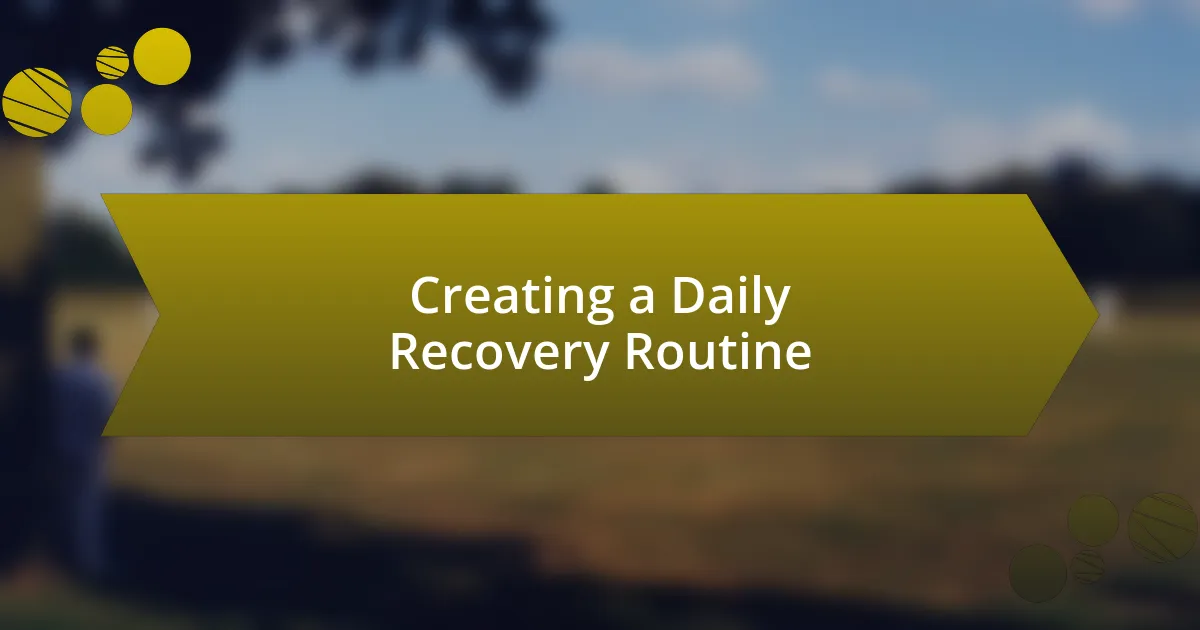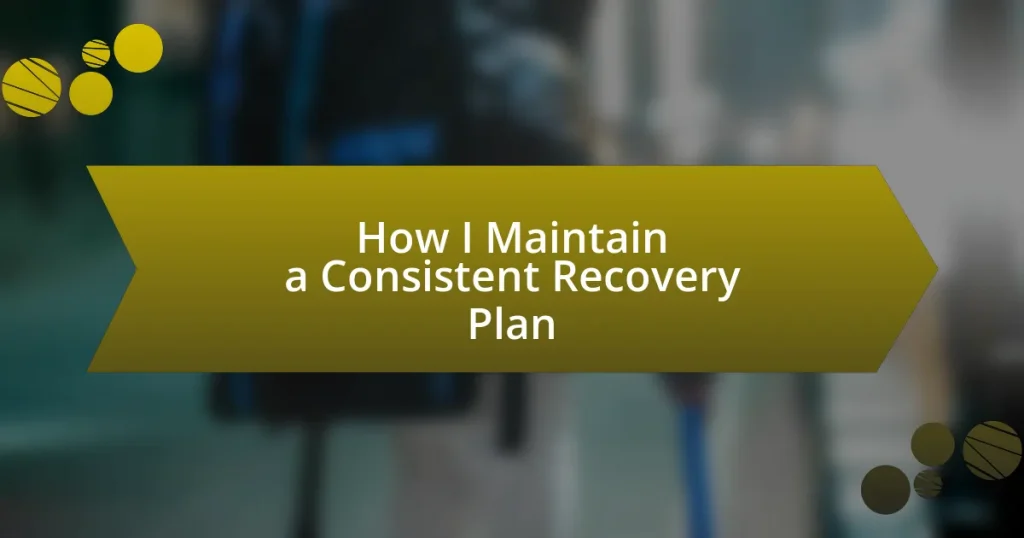Key takeaways:
- Recovery is a personal journey that requires self-awareness, understanding triggers, and developing coping mechanisms.
- Establishing specific, measurable recovery goals and regularly tracking progress can help maintain motivation and clarity.
- Creating a daily routine incorporating morning reflections, physical activity, and relaxation techniques fosters stability in recovery.
- Incorporating support systems and celebrating milestones reinforces commitment and highlights the progress made throughout the journey.

Understanding Recovery Fundamentals
Recovery isn’t just a one-size-fits-all process—it’s the foundation of maintaining long-term well-being. Reflecting on my journey, I remember grappling with the enormity of the changes ahead. How could I possibly navigate this? It wasn’t until I embraced the notion that recovery is a personal and evolving journey that I began to find my footing.
The fundamentals of recovery hinge on understanding one’s own triggers and coping mechanisms. I vividly recall moments when the urge to revert to old habits felt suffocating, and it was my self-awareness that saved me. Have you ever found yourself caught in a cycle of temptation, doubting if you can prevail? In those instances, my ability to recognize my triggers helped me create a proactive plan, which kept me grounded and focused.
Moreover, mindfulness plays a critical role in recovery. Engaging deeply with my emotions was unsettling at first—it took time to realize that it was okay to feel vulnerable. When I started practicing mindfulness techniques, such as deep breathing and journaling, I discovered a newfound clarity. Can you remember a time when taking a moment to breathe changed your perspective? Those small practices became my lifelines, guiding me back when I felt adrift.

Establishing Personal Recovery Goals
Establishing personal recovery goals is a crucial step that can often feel overwhelming. I remember sitting down with a blank notebook, unsure of where to begin. The key was to start small—focusing on specific, measurable actions rather than trying to tackle everything at once. Setting goals that resonate with my values allowed me to create a clear path forward.
To effectively establish these goals, consider the following:
- Identify what recovery means to you personally.
- Break down larger goals into smaller, achievable steps.
- Make your goals measurable—like attending a support group weekly or journaling daily.
- Reflect on your progress regularly to adjust your goals as necessary.
- Celebrate small victories to maintain motivation and boost self-esteem.
Each of these strategies has shaped my approach, helping me maintain clarity through the ups and downs of recovery. It’s essential to remember that these goals aren’t set in stone; they are living, breathing parts of your journey.

Creating a Daily Recovery Routine
Creating a daily recovery routine significantly impacts how I navigate my journey. For me, starting the day with a consistent morning ritual has been invaluable. When I wake up, I take a moment to reflect on my goals, often journaling to clarify my thoughts. This practice not only centers my mind but also sets a positive tone for the rest of the day.
Another aspect I’ve found crucial is scheduling time for physical activity daily. I remember when I first introduced regular exercise into my routine—initially, it felt like a chore. But as I persisted, I began to notice heightened energy levels and a clearer mind. Now, whether it’s a brisk walk or a structured workout, I treat this time as non-negotiable for both my body and mind.
Lastly, I incorporate relaxation techniques like meditation into my evenings. This practice helps me process the day’s emotions and prepare for the next. On particularly tough days, I have even turned to guided meditation apps, which remind me I’m not alone in this process. Building such dependable habits fosters a sense of stability that I deeply appreciate in my recovery journey.
| Routine Element | Personal Experience |
|---|---|
| Morning Reflection | Journaling to focus my thoughts and set intentions |
| Physical Activity | Initially a chore, now vital for my energy and clarity |
| Evening Relaxation | Meditation as a way to process the day and prepare for tomorrow |

Incorporating Support Systems
Incorporating support systems has been a game-changer for me in maintaining a consistent recovery plan. When I first joined a support group, I was hesitant, thinking I could go it alone. However, sharing my experiences with others who truly understood my struggles made me realize I didn’t have to carry the burden by myself. Listening to their stories not only inspired me but also reminded me that I was part of a larger community.
I’ve also leaned heavily on family and friends throughout my recovery journey. When I faced challenging moments, reaching out to my best friend changed everything. There were days when just having her listen validated my feelings, helping me feel grounded and less isolated. It’s incredible how a simple phone call can shift my perspective and reinforce my motivation.
Moreover, I actively seek out mentors who have successfully navigated their own recovery. Their guidance has been invaluable, providing insights that only someone who has “walked the walk” can offer. I often reflect on how their experience not only encourages me but equips me with the tools to handle setbacks. Having a reliable support system reminds me that recovery isn’t just a solitary endeavor; it’s a shared journey filled with both challenges and triumphs.

Tracking Progress and Adjustments
Tracking my progress has become an essential part of my recovery journey. I find that keeping a journal not only helps me document my feelings and achievements but also serves as a reflective tool. Looking back at my entries, I can see the patterns—what worked and what didn’t—and that insight empowers me to make necessary adjustments.
When I notice a certain approach isn’t yielding the desired results, I take time to reassess my goals. For instance, there was a period when I was struggling to maintain consistency in my exercise routine. By recognizing that my intensity was too high, I recalibrated my plan to include shorter, more manageable workouts. This adjustment not only made it easier to stick to my routine but also reignited my motivation. How have you adjusted your plans in response to what you’re learning about yourself?
In addition, I often check in with my support network for their perspective. They offer valuable feedback that I might overlook—like when my friend pointed out that I was becoming too critical of myself during setbacks. This perspective was a wake-up call, reminding me that progress isn’t always linear. Their insights help me refine my approach and keep my recovery aligned with my evolving needs.

Overcoming Common Challenges
It’s natural to face hurdles during a recovery journey, and I often find that the biggest challenge is self-doubt. There was a time when I encountered a particularly tough week that left me questioning my commitment. Instead of letting that doubt spiral, I turned it into a learning opportunity and slowly began to acknowledge my small victories. I often ask myself, what can I learn from this experience? This shift in mindset helps me to flip frustration into motivation.
Time management also becomes a significant hurdle. Balancing work, family, and self-care can stretch my schedule thin. I remember a month where everything seemed to pile up, and I felt overwhelmed. In that moment, I took a step back and implemented a prioritization system. Breaking my tasks into daily goals not only made my days feel more manageable but also brought a sense of accomplishment. When chaos strikes, it’s about reminding ourselves to focus on what’s achievable today.
I’ve learned that setbacks are an integral part of the recovery process. When I experienced a relapse in my routine, it felt devastating, almost like a step backward. I had to remind myself that slipping up doesn’t erase progress—it’s just a part of the journey. I often ask myself, how can I use this moment to strengthen my resolve? By embracing setbacks as opportunities for growth, I transform potential roadblocks into stepping stones towards my consistent recovery plan.

Celebrating Milestones and Successes
Recognizing and celebrating milestones is a crucial aspect of maintaining motivation throughout recovery. I remember the day I hit my first month without a setback; I felt a rush of pride and joy. It’s those moments that light up the journey, reminding me how far I’ve come and encouraging me to keep pushing forward. I often ask myself, what does this achievement really mean for my overall journey? Each small victory adds up, reinforcing my belief in continued progress.
When I completed a major goal, such as running my first 5K after months of training, I wanted to do something special to mark the occasion. I planned a small gathering with friends, and their support amplified my happiness. It wasn’t just about crossing the finish line; it was about sharing that joy with those who cheered for me along the way. How often do we pause to relish our successes? Taking a moment to celebrate not only solidifies the experience in my memory but also strengthens my commitment to the recovery process.
Every time I look back at my journey, I see milestones as markers of resilience. For instance, I keep a journal where I jot down achievements—big or small—along with my feelings about each one. This practice helps me reflect on what those successes mean beyond just surface-level accomplishments. It’s almost like creating a personal trophy case filled with reminders of my strength. When faced with challenges, those documented successes serve as a powerful source of motivation, pushing me to push through the hard times.













